
Sarah Friar is chief executive officer of Nextdoor, the app where you plug into the neighborhoods that matter to you. Neighbors turn to Nextdoor daily to receive trusted information, give and get help, and build real-world connections with those nearby—neighbors, local businesses, and public agencies.
Prior to Nextdoor, Sarah served as chief financial officer at Square. Under Sarah’s leadership, the company launched its initial public offering in 2015 and added $30 billion in market capitalization.
Before her tenure at Square, Sarah served as senior vice president of finance & strategy at Salesforce. Sarah also held executive roles at Goldman Sachs, as well as leadership positions at McKinsey in both London and South Africa. Also on the board of Slack, Sarah is a Fellow of the inaugural class of the Finance Leaders Fellowship Program, a member of the Aspen Global Leadership Network and co-founder of Ladies Who Launch, a network that mentors and inspires women entrepreneurs and business owners.
Sarah grew up in Northern Ireland and earned her MEng in Metallurgy, Economics, and Management from the University of Oxford and her MBA from the Stanford University Graduate School of Business, where she graduated as an Arjay Miller scholar.
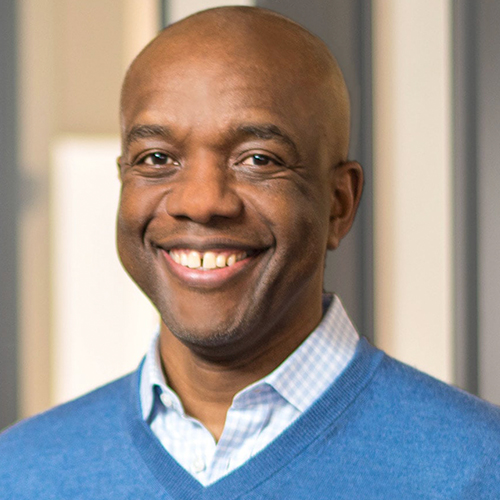
As of January 2022, James Manyika is a senior partner emeritus at McKinsey & Company, and chairman and director emeritus of McKinsey Global Institute (MGI). He was previously a member of McKinsey’s board, known as the Shareholders Council. He is currently Senior Vice President of Technology and Society at Google, a newly-created position reporting directly to the CEO of Alphabet.
Based in Silicon Valley for more than 20 years, James has advised the chief executives and founders of many of the world’s leading tech companies on strategy and growth, product, and business innovation. He has also advised other chief executives outside the tech sector on issues related to innovation, the digital economy, and other global trends. In addition to his leadership of MGI, James has led research on technology’s impact on business and the economy, the future of work, productivity and competitiveness, and corporations in the 21st century. James published a book on AI and robotics earlier in his career, more recently published No Ordinary Disruption on global economic trends, and continues to publish numerous articles and reports.
James was appointed by President Barack Obama to serve as vice chair of the Global Development Council at the White House and by two US Commerce Secretaries to the Digital Economy Board and to the National Innovation Board as part of the Competes Act. He serves on the board of the Council on Foreign Relations (CFR) and is a member of the Trilateral Commission. He has served on several national and international taskforces, most recently cochairing CFR’s taskforce on innovation and national security, and appointed by the governor to cochair the state of California’s future of work commission.
He is involved in research institutes including serving on the board of the Broad Institute of MIT and Harvard, and advisory boards at Oxford, MIT, LSE, and Stanford, including as a member of the steering committee for the 100-year study of AI, and at Harvard’s Hutchins Center for African and
African American Research. He has been appointed a visiting professor at Oxford’s Blavatnik School of Government, and a member of the National Academies of Sciences, Engineering, and Medicine’s committee on responsible computing.
A Rhodes Scholar, James received a DPhil, MS, and MA from Oxford in AI and robotics, mathematics, and computer science, and a BS first class in electrical engineering from the University of Zimbabwe. He has been elected a fellow of the American Academy of Arts and Sciences, a distinguished fellow of Stanford’s AI Institute, a visiting fellow of All Souls, Oxford, a lifetime fellow of the Royal Society of Arts, and a research fellow of DeepMind.
James is on the boards of the Hewlett, MacArthur, and Markle philanthropic foundations and a trustee of the Aspen Institute. He was a nonresident senior fellow of the Brookings Institution in Economic Studies, a visiting scientist at NASA Jet Propulsion Labs, and a faculty exchange fellow at MIT. At Oxford, he was a member of the Programming Research Group and the Robotics Research Lab, and was awarded a research fellowship and elected a fellow of Balliol College.
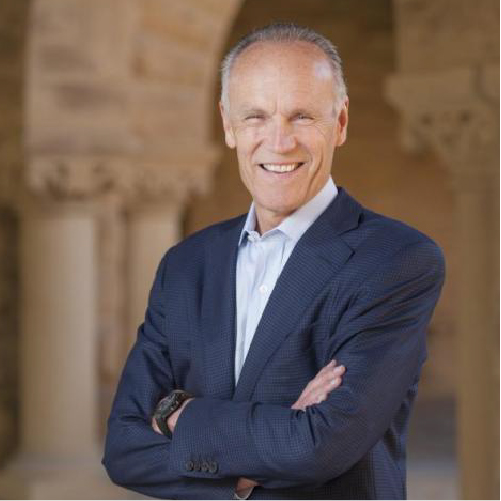
Steven A. Denning is the Chairman Emeritus of General Atlantic LLC, a firm he joined in 1980 and has helped build into a leading global growth equity firm with $40 billion in assets under management and fourteen offices worldwide.
Denning joined GA after working with McKinsey & Company. He received an M.B.A. from Stanford Graduate School of Business in 1978. Prior to business school, Denning served for six years in the U.S. Navy, where he also earned an M.S. degree from the Naval Postgraduate School in Monterey, California. He received a B.S. from the Georgia Institute of Technology in 1970, and an honorary doctorate in 2019.
Denning is a member of the Board of Directors of College Advising Corps, the New York Regional Plan Association, the Markle Foundation, Blue Meridian Partners, Inc., and the National Park Foundation, as well as a member of its Executive Committee, and is vice chair of the Board of Trustees of the Carnegie Endowment for International Peace, a member of the Board of Trustees of the Bridgespan Group, and a member of the Starr Companies Advisory Board. He is also a member of the Columbia Climate Board of Advisors, and a member of its Executive Committee. Denning is vice chair of the Human-Centered Artificial Intelligence Advisory Council, chair of the Global Advisory Council to the President and the Natural Capital Advisory Council, all at Stanford University, and is a member of the Advisory Council of the Freeman Spogli Institute, the Knight-Hennessy Scholar Program Advisory Board and the Stanford Distinguished Careers Institute Advisory Council.
Denning is former chairman of the Board of Trustees of Stanford University and former Co-Chair of the Board of Directors of The Nature Conservancy (TNC). He is emeritus chairman of the Stanford Graduate School of Business Advisory Council, and a lifelong trustee of The Brookings Institution, the American Museum of Natural History and the Georgia Tech Foundation. Denning was formerly a trustee of the National Parks Conservation Society. He is a life member and former member of the board of the Council on Foreign Relations. He is also a former member of the board of the McKinsey Investment Office Advisory Council, the Georgia Tech Foundation and National Advisory Board, the School of Economics and Management at Tsinghua University Advisory Board, the Cancer Research Institute, and the Connecticut Science Center.
Denning grew up in Salt Lake City, UT. He and his wife, Roberta, currently reside in Greenwich, CT and San Francisco.
Dario Amodei is chief executive officer and co-founder of Anthropic, an artificial intelligence (AI) safety and research company working to build reliable, interpretable and steerable AI systems.
Previously Dario was vice president of research at OpenAI, during which he set the overall research direction at the organization, led the efforts to build GPT-2 and GPT-3, and led several teams focused on long-term safety research, including how to make AI systems more interpretable and how to embed human preferences and values in future powerful AI systems. Before working at OpenAI, Dario was a senior research scientist at Google, serving as a deep learning researcher on the Google Brain team, working to extend the capabilities of neural networks.
Erik Brynjolfsson’s research examines the effects of information technologies on business strategy, productivity and performance, digital commerce, and intangible assets. A best-selling author, he writes and speaks to global audiences about these topics.
Erik is the director of the Stanford Digital Economy Lab and the Jerry Yang and Akiko Yamazaki Professor and senior fellow at the Stanford Institute for Human-Centered AI (HAI), He also serves as the Ralph Landau Senior Fellow at the Stanford Institute for Economic Policy Research (SIEPR), professor by courtesy at the Stanford Graduate School of Business and Stanford Department of Economics, and a research associate at the National Bureau of Economic Research (NBER).
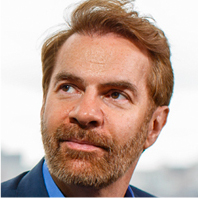
One of the most-cited authors on the economics of information, Erik was among the first researchers to measure productivity contributions of IT and the complementary role of organizational capital and other intangibles. He has done pioneering research on digital commerce, the Long Tail, bundling and pricing models, intangible assets, and the effects of IT on business strategy, productivity, and performance.
Erik speaks globally and is the author of nine books including, with co-author Andrew McAfee, best-seller The Second Machine Age: Work, Progress and Prosperity in a Time of Brilliant Technologies, and Machine, Platform, Crowd: Harnessing Our Digital Future. He has authored more than 100 academic articles and holds five patents. He received bachelor’s and master’s degrees from Harvard University in applied mathematics and decision sciences and a Ph.D. from MIT in managerial economics.

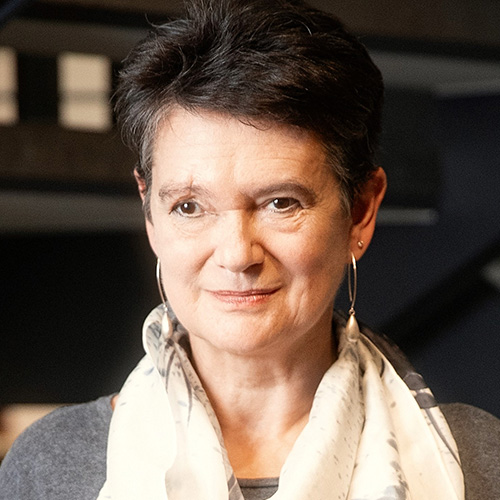
Professor Diane Coyle is the Bennett Professor of Public Policy at the University of Cambridge. Diane co-directs the Bennett Institute where she heads research under the themes of progress and productivity. Her new book, Cogs and Monsters, looks at how economics needs to change, while her previous book, Markets, State and People – Economics for Public Policy, examines how societies reach decisions about the use and allocation of economic resources.
Diane is also a director of the Productivity Institute, a fellow of the Office for National Statistics, an expert adviser to the National Infrastructure Commission, and Senior Independent Member of the ESRC Council.
She has served in public service roles including as vice chair of the BBC Trust, member of the Competition Commission, of the Migration Advisory Committee and of the Natural Capital Committee. Diane was professor of economics at the University of Manchester until March 2018 and was awarded a CBE for her contribution to the public understanding of economics in the 2018 New Year Honours.
Diane’s research interests include economic statistics and the digital economy, competition policy and digital markets, economics of new technologies, natural capital, and infrastructure. Her books include GDP: A Brief but Affectionate History, The Economics of Enough, The Soulful Science, and The Weightless World. Her recent papers have been published by Science, Review of International Political Economy, Nature, Antitrust Law Journal, and Regional Studies.

An accomplished entrepreneur, executive, and investor, Reid Hoffman has played an integral role in building many of today’s leading consumer technology businesses. In 2003 he co-founded LinkedIn, the world’s largest professional networking service. In 2009 he joined Greylock. He currently serves on the boards of Aurora, Coda, Convoy, Entrepreneur First, Microsoft, Nauto, Neeva, Xapo, and a few early stage companies still in stealth.
In addition, Reid serves on a number of not-for-profit boards, including Kiva, Endeavor, CZ Biohub, New America, Berggruen Institute, Opportunity@Work, the Stanford Institute for Human-Centered AI, and the MacArthur Foundation’s Lever for Change. He is the host of “Masters of Scale,” an original podcast series and the first American media program to commit to a 50-50 gender balance for featured guests.
Reid is the co-author of four best-selling books: The Start-Up of You, The Alliance, Blitzscaling, and Masters of Scale. He is an Aspen Institute Crown Fellow, a Marshall Scholar at Oxford, and a graduate of Stanford University.
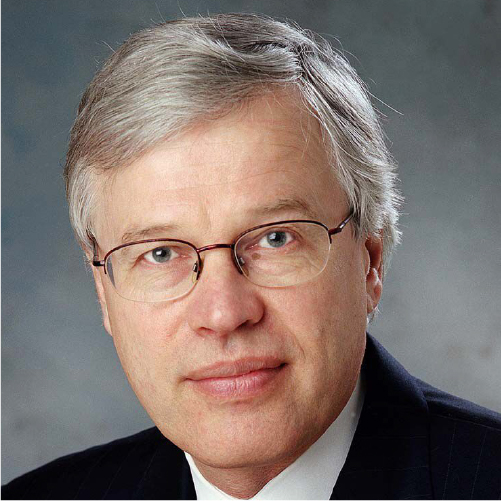
Bengt Holmström is the Paul A. Samuelson Professor of Economics, Emeritus, at Massachusetts Institute of Technology, where he was head of the Economics Department from 2003-2006. He held a joint appointment with MIT’s Sloan School of Management.
Holmström received his doctoral degree from Stanford University in 1978. Before joining MIT in 1994, he was the Edwin J. Beinecke Professor of Management at Yale University’s School of Management (1983-94) and associate professor at the Kellogg Graduate School of Management at Northwestern University (1979-82).
Holmström is a microeconomic theorist, best known for his research on the theory of contracting and incentives especially as applied to the theory of the firm, to corporate governance and to liquidity problems in financial crises. In 2011, he co-authored the book, Inside and Outside Liquidity, with Jean Tirole.
He was awarded the 2016 Sveriges Riksbank Prize in Economic Sciences in Memory of Alfred Nobel for his contributions to contract theory (together with Oliver Hart).
He is a former board member of the Nokia Corporation (1999-2012) and Aalto University (2010- 2017) and serves on several academic advisory boards, including Toulouse School of Economics and Luohan Academy.
Jonathan Levin is the Philip H. Knight Professor and dean of Stanford Graduate School of Business. A distinguished economist and academic leader, he was appointed as the tenth dean of the school in September 2016.
Under Dean Levin’s leadership, Stanford GSB has strengthened its position as a preeminent institution of management research and education. The school has invested in new research programs that span the management disciplines, expanded and innovated in its educational programs, and developed ambitious collaborations to address critical problems in technology and sustainability, where business decisions affect the lives of everyone on the planet.
Dean Levin joined the Stanford faculty in 2000. He rose through the ranks to become the Holbrook Working Professor of Price Theory in the Department of Economics. He served as Chair of Economics from 2011 to 2014, a period of rising stature for the department.
In 2011, Dean Levin received the John Bates Clark Medal as the economist under the age of 40 who has made the most significant contribution to economic thought and knowledge. He is widely recognized for his scholarship in industrial organization, microeconomics, and market design. Dean Levin is a fellow of the American Academy of Arts and Sciences, and has won both department and school-wide awards for distinguished teaching.
Dean Levin currently serves as a member of President Biden’s Council of Advisors on Science and Technology, and as a Trustee of the Gordon and Betty Moore Foundation. Over his career, Dean Levin has consulted widely in industry and government. He was part of the expert group that designed the first vaccine Advance Market Commitment for pneumococcal disease, and participated in the design of the FCC’s noted incentive auction for broadcast spectrum.